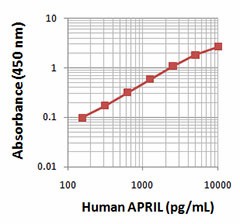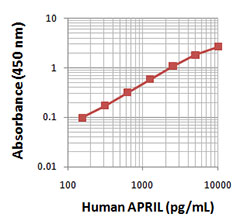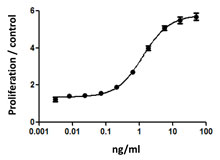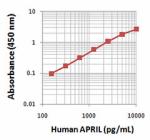- Clone
- 53E11 (See other available formats)
- Regulatory Status
- RUO
- Other Names
- A Proliferation Inducing Ligand (APRIL), TNFSF13, CD256, TALL2, TRDL1
- Isotype
- Mouse IgG2b, κ
- Ave. Rating
- Submit a Review
- Product Citations
- publications

| Cat # | Size | Price | Quantity Check Availability | Save | ||
|---|---|---|---|---|---|---|
| 524903 | 50 µg | 100€ | ||||
| 524904 | 500 µg | 428€ | ||||
APRIL (A Proliferation-Inducing Ligand), also known as TNFSF13, stimulates cell proliferation. It is a member of the TNF superfamily of ligands, being most closely related to BAFF, with which it shares 30% amino acid sequence identity. APRIL is cleaved intracellularly by furin and is believed to exist mainly in a secreted, soluble form. As with most other TNF family members, APRIL exists as a functional homotrimer (total MW = 90 kD). It can bind to two cell-surface receptors: BCMA and TACI, which it shares with BAFF, to exert downstream T- and B-cell regulatory effects. It also possesses a heparin binding domain and has been demonstrated to bind to proteoglycans on the cell surface.
APRIL is most well known for its tumor proliferation effects. It is a potential biomarker, with serum levels elevated for certain cancers and expression levels elevated in cancer tissues. It is also a potential biomarker for certain autoimmune diseases. In fact, recombinant TACI has been brought to clinical trials as a neutralization drug against APRIL and BAFF for the treatment of systemic lupus erythematosus (SLE).
Besides forming homotrimers, APRIL can also form functional heterotrimers with BAFF. The stoichiometric relationship of the protomeric units is still unclear; however, it appears that these heterotrimers are significant in that they are elevated in the serum of certain autoimmune patients.
APRIL also forms an endogenous chimeric protein with another related protein, TWEAK, effectively called TWE-PRIL. It is believed that TWE-PRIL is membrane bound, and consists of the N-terminus of TWEAK with its transmembrane domain, and the C-terminus of APRIL with its receptor binding domain.
Product Details
- Verified Reactivity
- Human
- Antibody Type
- Monoclonal
- Host Species
- Mouse
- Immunogen
- His-cohesin-C-terminal APRIL ectodomain
- Formulation
- Phosphate-buffered solution, pH 7.2, containing 0.09% sodium azide.
- Preparation
- The antibody was purified by affinity chromatography, and conjugated with biotin under optimal conditions.
- Concentration
- 0.5 mg/ml
- Storage & Handling
- The antibody solution should be stored undiluted between 2°C and 8°C. Do not freeze.
- Application
-
ELISA Detection - Quality tested
- Recommended Usage
-
Each lot of this antibody is quality control tested by ELISA assay. For sandwich ELISA detection applications, a concentration range of 0.5-2 µg/ml is recommended when used in conjunction with purified 33H5 (Cat. No. 524802) as the capture antibody, and recombinant human APRIL (TNFSF13) (ELISA Std.) (Cat. No. 591309) as the protein standard. It is recommended that the reagent be titrated for optimal performance for each application.
- Application Notes
-
Clone 53E11 reacts with recombinant APRIL homotrimer and recombinant APRIL-BAFF heterotrimer.
- RRID
-
AB_2562635 (BioLegend Cat. No. 524903)
AB_2562635 (BioLegend Cat. No. 524904)
Antigen Details
- Structure
- Transmembrane protein of 26 kD, forms a homotrimer that is cleaved from the cell surface resulting in the soluble form of APRIL; forms heterotrimers with BLyS (BAFF)
- Distribution
-
T cells, B cells, dendritic cells, monocytes, and macrophages
- Function
- Induces proliferation of T and B cells, promotes IgA class switching and downregulates T-cell dependent antibody responses, regulates the growth of a variety of tumor cells
- Ligand/Receptor
- TNFRSF13b (TACI), TNFRSF17 (BCMA)
- Cell Type
- B cells, Dendritic cells, Macrophages, Monocytes, T cells
- Biology Area
- Apoptosis/Tumor Suppressors/Cell Death, Cell Biology, Signal Transduction
- Molecular Family
- Cytokines/Chemokines
- Antigen References
-
1. Hymowitz, S, et al. 2005. J. Biol. Chem. 280:7218.
2. Ingold K, et al. 2005. J. Exp. Med. 201:1375.
3. Good K, et al. 2009. J. Immunol. 182:890.
4. Bossen C, et al. 2008. Blood 111:1004.
5. Bossen C, et al. 2006. J. Biol. Chem. 281:13964.
6. Pradet-Balade B, et al. 2002. EMBO J. 21:5711.
7. Hahne M, et al. 1998. J. Exp. Med. 188:1185.
8. Medema JP, et al. 2003. Cell Death Differ. 10:1121.
9. Planelles L, et al. 2007. Haematologica. 92:1284.
10. Dillon SR, et al. 2010. Arthritis Res. Ther 12:R48.
11. Wallweber H, et al. 2004. J. Mol. Biol. 343:283.
12. Chen Y, et al. 2011. PLoS ONE 6:e22202.
13. Roschke V, et al. 2002. J. Immunol. 169:4314. - Gene ID
- 8741 View all products for this Gene ID
- Specificity (DOES NOT SHOW ON TDS):
- APRIL
- Specificity Alt (DOES NOT SHOW ON TDS):
- APRIL
- App Abbreviation (DOES NOT SHOW ON TDS):
- ELISA Detection
- UniProt
- View information about APRIL on UniProt.org
Related FAQs
- How many biotin molecules are per antibody structure?
- We don't routinely measure the number of biotins with our antibody products but the number of biotin molecules range from 3-6 molecules per antibody.
Other Formats
View All APRIL Reagents Request Custom Conjugation| Description | Clone | Applications |
|---|---|---|
| Biotin anti-human APRIL (TNFSF13, CD256) | 53E11 | ELISA Detection |
Customers Also Purchased
Compare Data Across All Formats
This data display is provided for general comparisons between formats.
Your actual data may vary due to variations in samples, target cells, instruments and their settings, staining conditions, and other factors.
If you need assistance with selecting the best format contact our expert technical support team.
 Login / Register
Login / Register 

















Follow Us